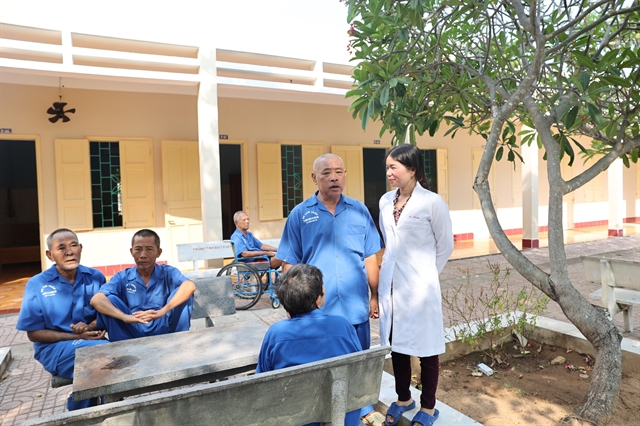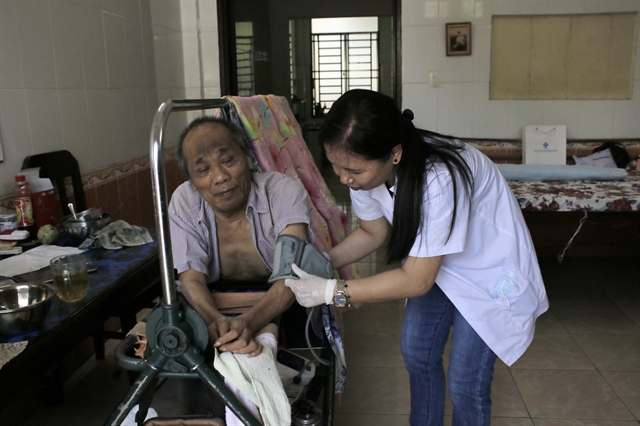The centre, which was established in 1977, currently cares for 46 severely wounded veterans, with a disability rate ranging from 81 per cent to 96 per cent.

A member of staff talks to veterans at Long Đất Rehabilitation Centre in Long Hải Town, Long Đất District in the southern province of Bà Rịa – Vũng Tàu.— VNA/VNS Photo Hoàng Nhị
BÀ RỊA - VŨNG TÀU — For nearly 48 years, the Long Đất Rehabilitation Centre for War Veterans and People with Meritorious Services has been providing care, rehabilitation and medical treatment for many severely wounded veterans, in Long Hải Town, Long Đất District, in the southern province of Bà Rịa – Vũng Tàu.
The veterans receive dedicated and thoughtful care from a team of doctors, nurses and staff at the centre, with many of those who are being looked after having spent more than half of their lives at the facility.
One such veteran, Nguyễn Văn Khả, 65, of the Mekong Delta province of Sóc Trăng, has been receiving care at the centre for 22 years.
Khả is now more alert, and his mental state has gradually been stabilising.
He still remembers his hometown and the years he has spent at the centre with remarkable clarity.
In moments of mental stability, he even serenades doctors and staff of the centre with a Vietnamese song titled 'Người tình trên chiến trận' (The Lover on the Battlefield).
Another veteran, Thạch Thị Lâm, 75, who is from the central province of Nghệ An, has been at the centre for 34 years.
Reflecting on her youthful days of service, Lâm recalls how, at 17 years old, she deceived her parents, adding an extra year to her age in order to meet the recruitment requirements for the army.
In early 1968, she was called up to serve as a worker in the Military Engineering Station on the battlefront in Laos, tasked with building the military routes and guiding her comrades.
In 1971, during one of her missions to guide the troops, she stepped on a landmine, resulting in injuries to both legs. Her right leg was amputated above the knee, while her left leg was severely damaged at the calf.
"When I first learned of the severity of my injuries, I was utterly devastated. I saw a dark future,” she said.
However, thanks to the support of her friends and family, she slowly overcame her despair and found peace in her treatment.
After receiving care in northern rehabilitation centres, Lâm requested a transfer to the centre in 1991.
"The place is a home built on the profound kindness of the State for us – those who have sacrificed part of our bodies for the nation,” she said.
At the centre, the doctors, nurses and staff are sometimes even more caring than the veterans’ own families.
“The centre is a source of happiness and consolation for many of us as we approach the final years of our lives," she said.
Another veteran, Nguyễn Duy Minh, suffers from 96 per cent disability.
He was wounded while serving on an international mission in Cambodia. In 1986, he was brought to the centre for care, rehabilitation and treatment.
After 39 years of living at the centre, it has become his second home and the doctors, nurses and fellow veterans are like his own family.
"Having been here for so many years, the doctors, nurses and staff treat me with such care and attention, as if I were their own kin," he said.
The Director of the centre, Tống Đức Bình, said the institute was established in 1977 and currently cares for 46 severely wounded veterans, with a disability rate ranging from 81 per cent to 96 per cent.
The veterans come from 20 provinces and cities across the country.
This is the only facility in southern Việt Nam dedicated to caring for veterans, who served during the resistance against American imperialism and in the Southwest Border Defence War.
Most of the veterans at the centre suffer from spinal injuries, paralysis of the lower limbs and other severe disabilities that leave them confined to wheelchairs, with no movement or sensation in their limbs.
Among the 46 veterans, the youngest is 64 years old, while the oldest is 85.
The centre’s Mental Health Department currently cares for 15 veterans with mental health disorders, including two female veterans, who require special care and attention.
Bình said that, over the years, the centre's staff, including civil servants and medical personnel, have always considered caring for the veterans to be like caring for their own relatives.
The veterans receive healthcare, emotional support and welfare benefits as stipulated by the Government.

Nurse Đặng Thị Nghĩa takes care of a veteran at Long Đất Rehabilitation Centre in Long Hải Town, Long Đất District in the southern province of Bà Rịa – Vũng Tàu.— VNA/VNS Photo Hoàng Nhị
Đặng Thị Nghĩa, a nurse who has been with the centre for two years, considers the veterans to be like her own family.
Her daily tasks involve dressing wounds, cleaning injuries and administering medications to the veterans.
She said: “Caring for the elderly is already challenging, but caring for veterans with physical and mental disabilities is even more so.”
However, she sees serving the veterans and people with meritorious services not just as a responsibility, but as a great honour.
“I treat them as family and always do my best to ensure they are happy and healthy,” she said. —VNS